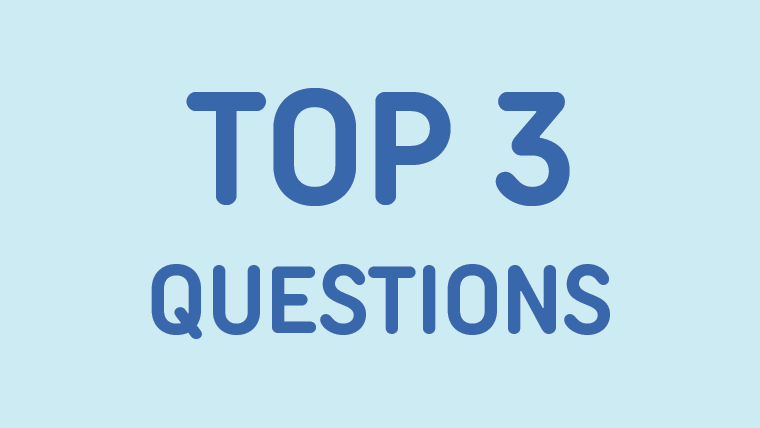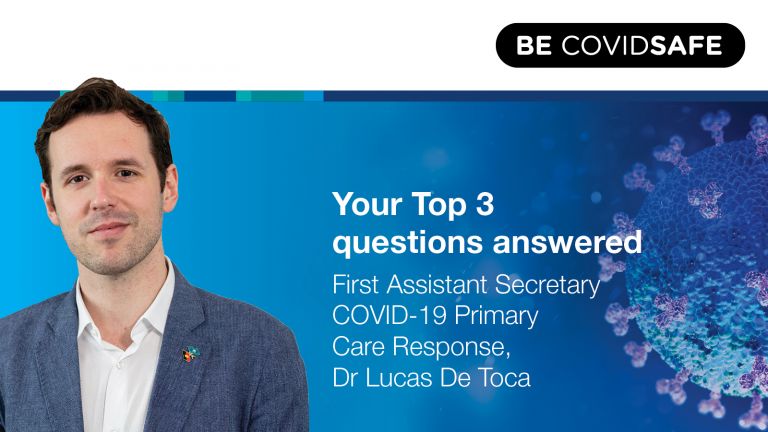
Good morning, my name is Dr Lucas De Toca and I lead the rollout of the vaccine program through general practice and pharmacies and other primary care settings. Today we will be answering some of the top questions that you have been asking on our social media channels and will be focusing on questions about children and their contact in the pandemic and vaccines for kids. So my shout out today, very strongly, goes to parents, guardians and people who look after kids, especially those of you who are in lockdown and having to work, while at the same time support home schooling, you are absolute troopers, this is harder for you than for many others of us and thank you for keeping yourself, your family and the broader community safe while continuing to support your kids. We are on the land of the Ngunnawal people. Dhawra nhuna, dhawra Ngunawal. Yanggu gulanyin ngalawiri, dhunayi, Ngunawal dhawra. Wanggarralijinyin mariny balan bugarabang. And I also extend the acknowledgement to the Traditional Owners of the lands where you may be watching from. We are joined today by Linda who, as you see, will be doing Auslan interpreting. Thank you Linda.
The first question today that we have is about the advice that the Australian Technical Advisory Group on Immunisation, or ATAGI, has provided in terms of vaccinating adolescents or children aged 12 to 15 years.
You will see there has been change in the last month with recommendations for younger people. Initially ATAGI recommended that people 12 to 15 years old in priority or at risk populations were prioritised to access vaccine, so at the moment all Aboriginal and Torres Strait Islander children 12 to 15, children with an underlying medical condition aged 12 to 15, all 12 to 15-year-olds who are participants of the National Disability Insurance Scheme, or the NDIS, as well as all 12 to 15- year-olds who live in remote communities that are receiving a whole of community vaccination program, are currently eligible to receive a COVID-19 vaccine, in this case the Pfizer vaccine or Comirnaty, which is approved for children in that age. From the 13th of September, this eligibility will be opened up to all children 12 to 15, so essentially anyone 12 years and over in Australia from the 13th of September will be eligible for a COVID-19 vaccine. At the moment, the only COVID-19 vaccine that is approved for people under 18 years of age in Australia is the Pfizer or Comirnaty vaccine, so anyone in that age range between 12 to 17, will be receiving a Pfizer vaccine. The Therapeutic Goods Administration, or the TGA, is currently reviewing the evidence, which there is plenty of from overseas and others, on the safety of the Moderna or Spikevax vaccine for people under 18 years of age, and we expect that they will have a conclusion on the appropriateness of these vaccines for people 12 to 17 years of age very soon. But, at the moment, the vaccine approved for people under 18 is the Pfizer vaccine. ATAGI, as for any age group, looks at safety, efficacy and overall program impact of vaccinating people in particular cohorts and they have advised that initially for priority groups, Aboriginal kids 12 to 15, or kids with underlying medical conditions, or who participate in the NDIS, or in remote communities, are an important group to make sure they have access to the vaccine initially, but then from the middle of September all 12 to 15-year- olds will have a chance to access it.
The questions that this raises, of course, is how we talk to children about the vaccines and COVID-19.
I am sure I cannot teach you anything that you already have not been doing over the last 18 months, in which all of you have been answering constant and constant questions from your children about the pandemic, the virus and how it is affecting and impacting their lives. For a lot of kids, this pandemic would actually be a significant proportion of their life to date, and we know that they will be hungry for information. I'm not telling you anything new or expecting to tell you how to suck eggs, but what the experts tell us is that it is important that we engage in those conversations with children. It might be hard to explain but it is important that they have as much information as adults do for topics that are appropriate. Questions like what is a vaccine? And trying to explain that in simple terms, like it is a shield or a tool that teaches your body how to fight an infection. I particularly liked as a kid, the wall-like analogies for their immune system, or which might not be appropriate in all contexts, but it is a really easy way to explain that your immune system is made up of millions of cells that help you fight the infection, and the vaccine is actually arming them with the plans on how to fight a particular enemy for when they come in contact with them, they can swiftly deal with it. The question about vaccine safety. Vaccination rates for children in Australia are somewhat highest in the entire world, in particular Aboriginal and Torres Strait Islander kids have incredibly high immunisation rates for other vaccines, so I am sure all of your kids are very used to receiving vaccines as part of their normal national immunisation program, so I am sure you are very familiar with having these conversations. In terms of will the vaccine hurt for those 12 years and over who may be eligible for the vaccine, you can confirm like with any other vaccine there will be a very brief prick and then get over it. In fact, this is anecdotal and not in any way scientific, but I have found that these vaccines, might be because of the low-density needles, actually hurt less than some other vaccines. It was a much quicker prick than I remember from other vaccines, but that is my experience, not a scientific fact.
Then the question is, is it really important to vaccinate kids? What is the impact of having kids vaccinated in the pandemic?
It is really manifold. We know, and it is still the case even with the more transmissible Delta variant, that older people are more susceptible to severe disease, hospitalisation and death from Covid. The older you are, the higher the risks for a bad outcome from COVID-19. That does not mean young people do not have bad outcomes and we have seen the start of the many unfortunately, the many tragic deaths we have had in the country due to Covid. We have also seen some in younger people. But in general, the older the person is, the higher the Covid risk is. We are seeing that the ongoing pattern of transmission and the fact that the Delta strain is more transmissible, is showing us more infection in younger people. We have seen school clusters in Queensland, the ACT, Victoria and NSW, and we have seen high numbers of young people infected with the virus. The obvious is vaccination provides that direct protection to people, even if their risk of Covid is lower, we make it much, much lower by making sure they are vaccinated, so vaccinating 12 to 15-year-olds provides them with that direct protection. There is also an impact on reducing transmission and what we are seeing in many other countries that started the vaccination program earlier than we did is that we see a seemingly paradoxical change in the transmission dynamics, by which younger people seem to be much more represented in case numbers than older people, even though older people are more susceptible to the disease. That is because most countries, like Australia, have prioritised the older people to get the vaccine first, so we have higher rates of protection among older people and other people more at risk, than we do among younger people, let alone adolescents or children who, at the moment, are not being vaccinated. It is not surprising to see what we are seeing in other countries, that with a significant proportion of the population covered, the majority of cases occur in the parts of the population that are unvaccinated, in this case we speak about younger kids. When eligibility opens for children from 12 to 15-year-olds broadly on 13 September and the next few months where more trials come into effect and the TGA will assess the safety and efficacy of the vaccine in even younger kids, it is important to consider giving the vaccine to those children, it will protect them directly, it will have an impact on reducing the transmission overall and it will help ringfence those parts of the community who cannot get vaccinated. We know that the vaccines are excellent at protecting from severe disease, we know that they are not infallible, but they are still good at preventing infection and transmission. It does not mean that you cannot get the virus, it does not mean that you cannot transmit it, but it reduces the chances. So by having as many people as possible vaccinated and especially by having everyone else in a household vaccinated, if there is a younger kid who cannot be vaccinated because the vaccines are not authorised for that age group yet, but everyone else is vaccinated, the chances of that kid contracting Covid are much lower. It protects the adolescents directly, it protects society by reducing overall transmission and it can help shield your household, particularly for people who cannot get vaccine at this stage.
That is all we had for today for this very vaccine and children focused Top Three. That was probably a bit more rambling than usual, but thank you so much for submitting your questions, thank you so much for staying COVIDSafe and doing the right thing, and Australia is getting vaccinated now at an incredible rate and it is all thanks to you. Thank you very much, see you next time and stay COVIDSafe.
Top 3 questions
- What did ATAGI consider when making the recommendation for 12+ to have a COVID-19 vaccine?
- How can I talk to my children about COVID vaccines?
- Is it really necessary to vaccinate children? Will this make any change to the pandemic?







